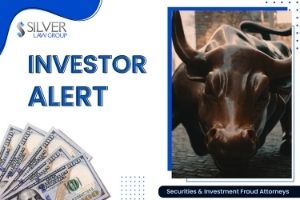Robinhood CEO Not Registered With Financial Industry Regulatory Authority – A Signal of Larger Risks to Main Street Investors to Come?
 FINRA, the Financial Industry Regulatory Authority, is the U.S. broker-dealer industry’s most prominent self-regulatory organization, authorized by Congress to protect investors by ensuring that the broker-dealer industry operates fairly and honestly. However, despite overseeing more than 600,000 brokers across the country, FINRA’s jurisdiction does not include Vlad Tenev, the CEO of Robinhood, who is not registered or licensed with the organization.
FINRA, the Financial Industry Regulatory Authority, is the U.S. broker-dealer industry’s most prominent self-regulatory organization, authorized by Congress to protect investors by ensuring that the broker-dealer industry operates fairly and honestly. However, despite overseeing more than 600,000 brokers across the country, FINRA’s jurisdiction does not include Vlad Tenev, the CEO of Robinhood, who is not registered or licensed with the organization.
Robinhood has been hailed as one of the fastest-growing online brokerage firms in the world, but has been the subject of extreme scrutiny over the past several weeks due to its role in recent market activity related to GameStop, AMC Theatres, and others.
Many Brokerage CEOs Are Not FINRA-Registered
Unfortunately, Tenev’s lack of FINRA registration is not an exception, but the industry norm. Robinhood’s response to this revelation has been that Tenev is the CEO of the holding company for Robinhood’s brokerage service, not the broker-dealer itself, meaning Tenev is not required to be registered. Nonetheless, FINRA’s website states that “we require individuals and firms who wish to conduct business with the investing public to achieve and maintain certification as members of FINRA.” Tenev’s implication in recent events has led many to question whether Tenev, and individuals in similar positions at other firms, should be deemed individuals conducting business with the investing public.
To become FINRA-registered, one must pass qualification exams, complete continuing education requirements, and FINRA registrants’ records become part of FINRA’s Central Depository System, where the public can access previous customer disputes and any regulatory incidents for FINRA-licensed individuals and brokerage firms. Most importantly, FINRA has jurisdiction and authority to institute enforcement proceedings against its members, which can sometimes result in fines, suspensions, and even permanent bars from the industry. This type of oversight could be highly beneficial to investors if extended to industry executives like Tenev.
Lack Of Registration Requirement Allows Owners To Operate “Boiler Rooms” With Limited Personal Exposure
In their current state, FINRA regulations permit brokerage executives to operate “boiler room” operations without having to become registered themselves. “Boiler room” is an industry term referring to a brokerage firm, which cold calls investors—often elderly or unsophisticated—and make extremely aggressive sales pitches to induce main street investors to put their hard-earned savings into risky, speculative, and flawed securities. The motivation is typically the high commissions callers receive for each sale. FINRA has instituted many regulatory proceedings against these operations and embarked on investor-education campaigns to prevent investors from falling victim to “boiler room” schemes.
In addition to traditional boiler rooms, a 2017 FINRA study revealed that there were 48 brokerage firms where at least 30% of their individual brokers have FINRA flags on their records, which include customer complaints, regulatory findings, criminal/civil judgements, and other financial marks such as tax or judgment liens. These brokerage firms continue to employ brokers who pose a high risk to the investing public, but the industry executives who can avoid registration under the current regulatory scheme face little liability, and are incentivized only to continue generating profits for their businesses and themselves.
This FINRA loophole allowing owners to operate brokerage firms without registration allows these operators to escape regulatory and/or civil liability for gross misconduct.
Future For Robinhood And Tenev Unclear
Following the recent market events that placed Robinhood and its CEO in national headlines, it is unclear what the regulatory response will be, or if there will even be one. However, as long as Tenev can lawfully evade FINRA registration, the self-regulatory organization lacks a significant lever of oversight over the popular online brokerage firm.
Let Silver Law Group Help With Your Securities Arbitration Claim
Our team of investor advocates can help you recover improper losses. Our team of leading securities attorneys routinely meet with clients by telephone or video conference and are capable of representing investors nationwide.
As passionate investor advocates, we frequently discuss hot topics in securities arbitration and investor rights. Control person liability is an important issue that requires SEC and FINRA oversight. Our attorneys have recovered millions of dollars pursuing claims against the operators of boiler room operations and other brokerage firms. Logic dictates that FINRA needs to amend its rules regarding ownership of a brokerage firm to better protect the public.
Silver Law Group is experienced in representing investors in securities and investment fraud cases nationwide. Our lawyers can help you recover investment losses due to stockbroker misconduct and most cases are handled on a contingency fee basis, meaning you won’t owe us any money until we recover your money for you. Scott Silver, managing partner of Silver Law Group, is the chairman of the Securities and Financial Fraud Group of the American Association of Justice and has extensive experience representing investors in securities and investment fraud cases. Please contact us for a confidential consultation at ssilver@silverlaw.com or toll free at (800) 975-4345.
 Securities Arbitration Lawyers Blog
Securities Arbitration Lawyers Blog

